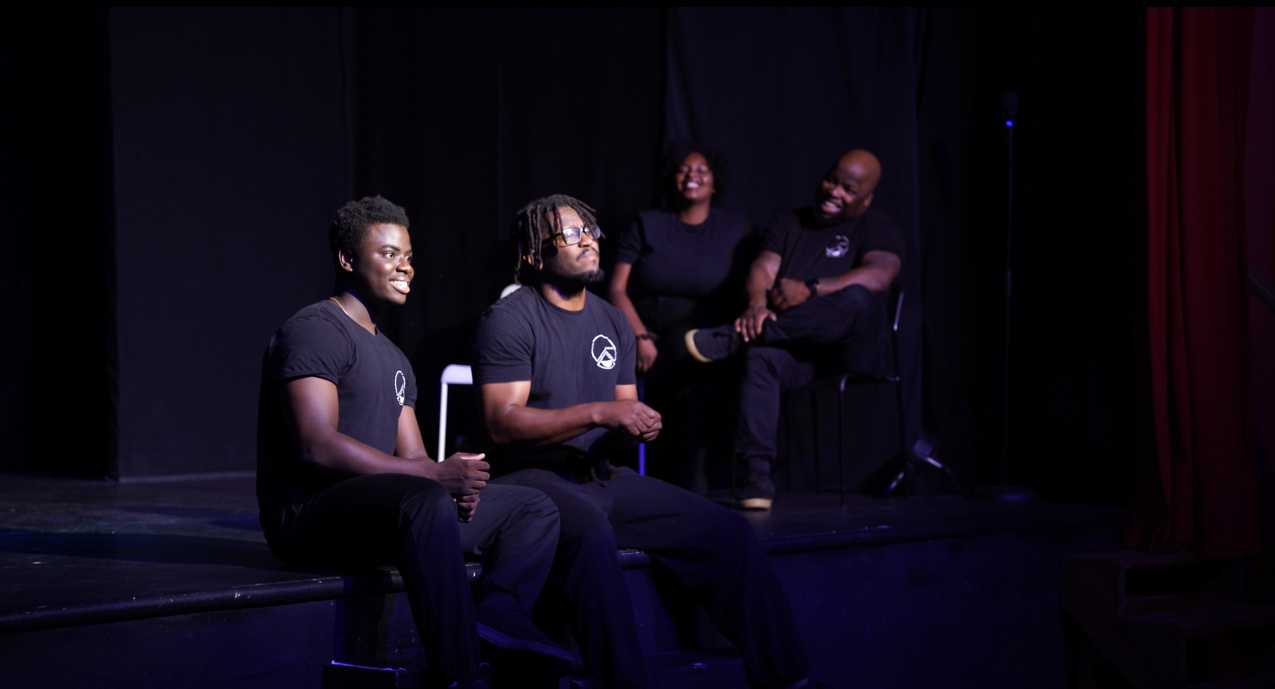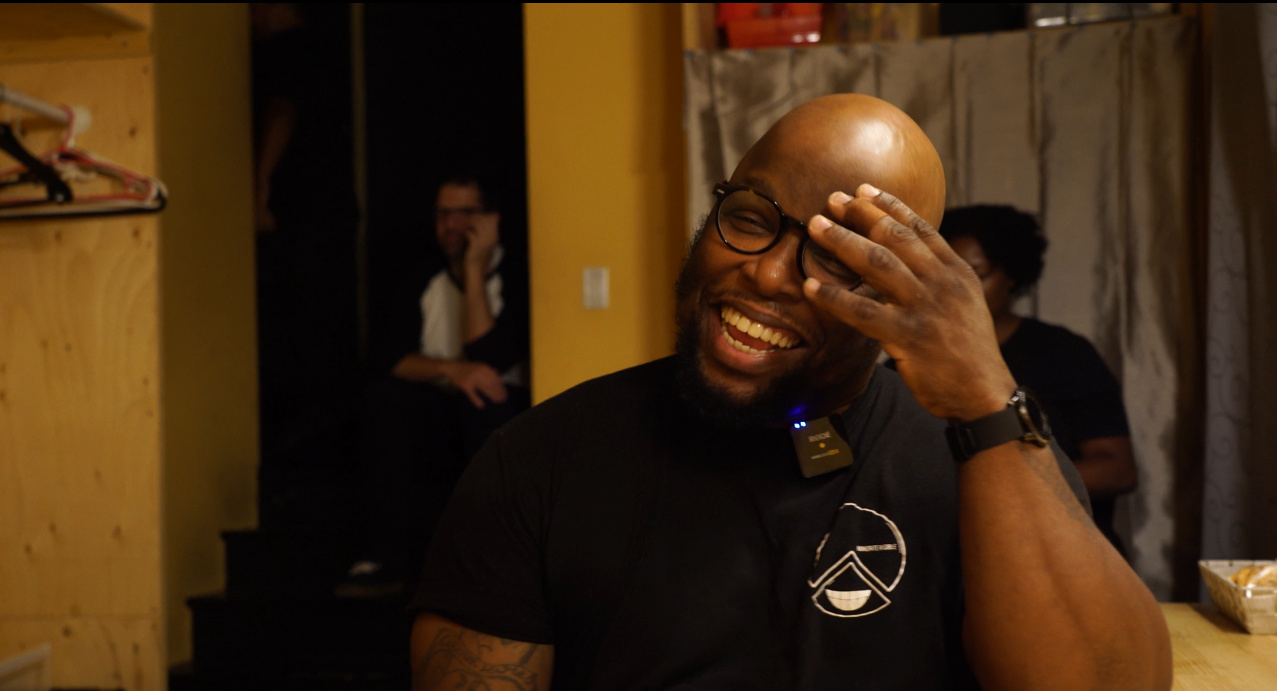Kenny Thomas is passionate about improv, but noticed a lack of cultural diversity in Quebec's bar improv leagues. To remedy this, he and his friends founded the Mouvement d’Improvisation Black (The Black Improv Movement) and La Minorité Risible leagues, spaces where players from visible minorities become the majority.
It's show night on this Friday, July 18. An hour before dusk, we arrive at La Comédie de Montréal theatre, where improviser Alex Laroche is hosting the improv league La Minorité Risible. Chairs are arranged in rows and are facing the large stage, ready to welcome the audience that will arrive in about thirty minutes. An employee directs us to the dressing rooms. A few improvisers are already there, laughing together. About ten minutes later, Kenny Thomas arrives. He's a bald man with tattooed arms, no taller than five-foot-five, wearing round tortoiseshell glasses. Everyone gets up, greets him, and makes jokes. He clearly has a unifying effect. The league's co-founder sits on a chair in front of a large mirror surrounded by yellow bulbs, reminiscent of a star's dressing room.
Coming Together Around the Performing Arts
Thomas grew up in a Haitian, Jehovah's Witness family. When he was eight, in the 1990s, his parents bought a property in Montreal North. Ever since then, he became immersed in the performing arts. Within the walls of his church, a group of mothers—including his—would get together once or twice a year to create plays inspired by the Bible. He puts his hand on his forehead, looking a little disheartened. "The other youngsters and I weren't really down with the idea, to be honest. Doing biblical reenactments wasn't cool back then," he says with a laugh.
He remembers always having this comedic side, being the one who made others laugh, the "life of the party" as he puts it, wearing the official black La Minorité Risible shirt. "In all my report cards, [my teachers] wrote: 'Very intelligent, but very talkative and makes jokes with his friends.'"
Thomas recalls his first introduction to improv in a workshop led by his fifth-grade teacher. "I did one or two improv scenes, and it was as if I'd been doing it my whole life... There was something there that allowed me to connect with other people, who weren't necessarily my friends. There was a form of power in that which I found super stimulating," he recalls.
Drawn to theatre, literature, and music, he was the opposite of his brother, who is 14 months older and passionate about sports. His father also had this artistic side. "He missed his calling. He was a good writer, good with his hands, and very eloquent. Everything he did, I found there was something creative about it," he says about his dad, a trained welder.
When he started at the Calixa-Lavalléehigh school, Thomas noticed there was no improv team. In tenth grade, he turned to theatre. "That year, our theatre teacher went on burnout three months before the end of the year. We put the play on all by ourselves," he says. The following year, actor Pierre Gendron helped them coordinate a new play and felt that young Thomas could try his luck at the National Theatre School of Canada. "It's rare that at 17, you have something that validates you, someone who believes in you," the improviser points out. He lets out a sigh. Under pressure from his mother, he took a plumbing and heating course, which he quit six months later. Today, Thomas is a Cégep Marie-Victorin graduate in social work.
He takes a sip of water before continuing. From 2006 to 2012, he was an improv coach for young people at his former high school in Montreal North. Among these students were those who, in 2008, would give him his first experience in a bar league, first as a referee, then as a player.
What is improv?
Improv is a form of theatre with no prepared text or material. In an improv match, there are two teams of six players each, who compete against each other in 12 timed improvisations. Each improv is determined by a card drawn that indicates the theme, the number of players allowed, the style (comparative or mixed improv), the duration, and the category. In Quebec, the Ligue nationale d’improvisation (LNI) is the most important league a player can join, following a selection camp.
"You played a lot of Haitian characters!"
"Back then, there were so few racialized people doing improv in bar leagues. At some point, you end up knowing everyone!" Thomas declares. He says this minority representation isn't just visual. "Humor is influenced by the cultural environment. The references, what builds the improv scenes, the ideas in the caucuses, are often from Quebec's landscape. [...] I realized that there was a side of my personality and my identity that I couldn't use in improv because the audience wouldn't really understand."
With his gaze turned to the ground, Thomas explains that he wasn't the first to think about creating a new league. Around the 2010s, through word-of-mouth, other performers like Samantha Fins and Richardson Zéphir discussed the idea of building a Black improv league, a project that appealed to Thomas. He looks up at the ceiling, searching for a memory. In 2013, after a match, two of his friends told him he had played a lot of Haitian characters. "But I'm Haitian... what do you mean?" he replied, looking perplexed. "It wasn't meant to be malicious, but at the same time, it pushed my thinking," Thomas continues. He then asked himself two questions: "When I'm on a stage, what am I playing? Who am I playing for?"
A Sense of Belonging
In 2015, he brought some friends together to create the Mouvement d’Improvisation Black (MIB). Thomas noticed that the league introduced a new audience to the art form: an audience that recognized themselves in the cultural references on stage. According to him, many of them had never seen improv or theatre before. "Some would come to us after the shows and say, 'My aunt/my mom does the exact same thing as that improv!'"
With his fingers interlocked, Thomas explains that the project went beyond just a new league: "When we got together, we asked ourselves a lot about what we wanted to bring to the world of improv. Did we really want to bring something new? Did we want to play with some clichés?" he says. He states that he doesn't feed into stereotypes but laughs at them in a way that makes the audience think about what's behind those clichés, just like his favorite comedian, Dave Chappelle, does. He takes off his glasses and places them in front of him. "The idea of the absent father, for example. I said, 'I know I left, but it was just to go get milk. The bus didn't come... so I came back home!'" he jokes. At the MIB's second match, a young Haitian woman came up to him. "Thank you for doing this for us," she told him. It's a phrase that still affects him today.
The league performing tonight was created in 2023. "The idea is to offer a space where people can see themselves, both those who are playing and those who come to see the show," Thomas specifies. The league can welcome all types of diversity, not just cultural. In fact, almost no ethnicity, gender, or age group is safe from jokes. "The problem is ignorance," he says. "It's understood that we're going to laugh at everyone a little." Most members of La Minorité Risible are of Haitian descent, but the co-founder still sees a "diversity within diversity" as he points to his team. "There's a player of Haitian descent who was adopted by a mixed Quebec couple [...] and she grew up in a suburb of Quebec City. But she doesn't have the same relationship [with her origins] as I do, who grew up with two Haitian parents in a Montreal context," he gives as an example.
"Improv is like a lever"

"It's a tool for working on all sorts of social skills, creating group dynamics, or a sense of belonging. For some people, it's a tool to overcome their shyness or break isolation," says Thomas, who has been a youth worker for 25 years. In recent years, he has given several improv workshops in various organizations, including youth centres and a women's shelter.
Laroche cuts him off; the show is about to start. "That's what improv has always been for me. It's meeting people you don't know, but in one improv scene, we understood each other!"
"I would never have started doing improv again if it hadn't been for you," a player from La Minorité Risible tells him. Thomas finds that this kind of phrase is "the best gratification in the world," because some league members have had negative experiences in their former college teams or elsewhere. "They decide to come back [to improv], to play the game, and they find their place." Today, nearly fifteen people are part of what Thomas doesn't hesitate to call his "family."
Outside the dressing rooms, on stage, Laroche begins to interact with the audience. The performers head backstage. Let the show begin!
Did you enjoy this article?
Every week, we send out stories like this one—straight to your inbox.





.jpeg)

.jpeg)
.jpg)
.jpg)